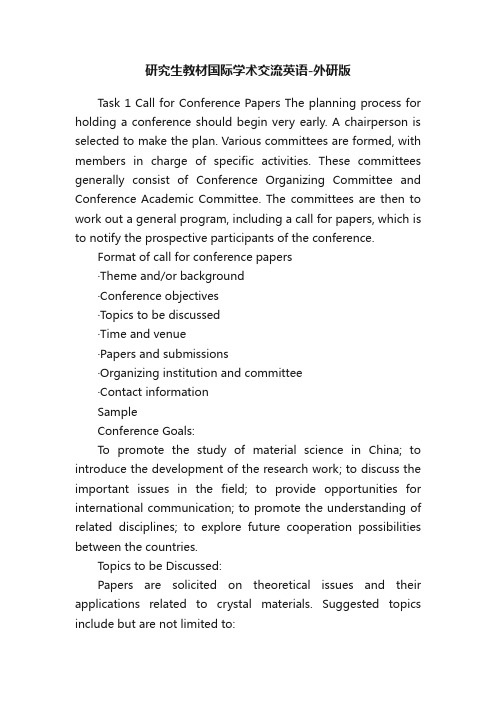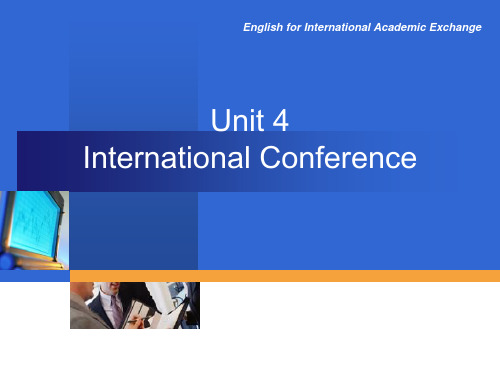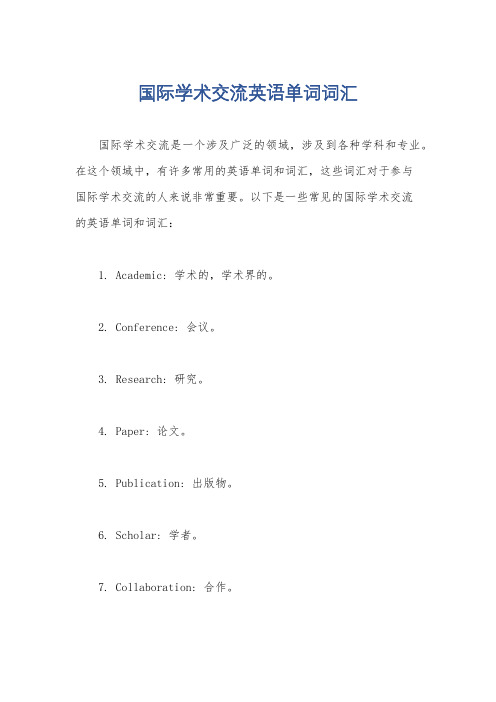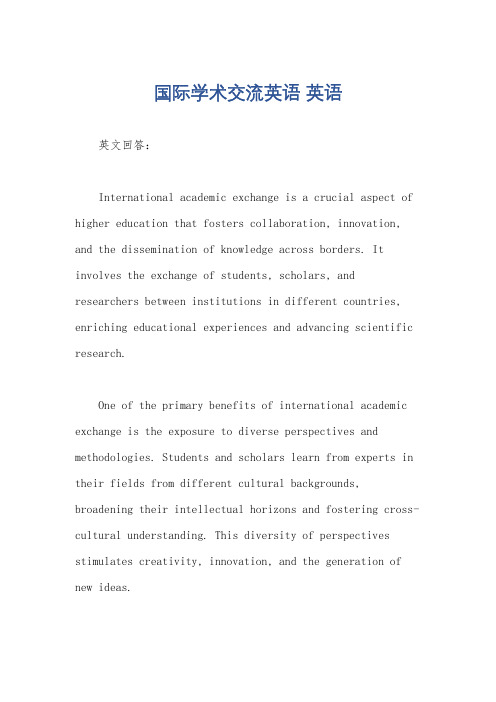国际学术交流英语
研究生教材国际学术交流英语-外研版

研究生教材国际学术交流英语-外研版Task 1 Call for Conference Papers The planning process for holding a conference should begin very early. A chairperson is selected to make the plan. Various committees are formed, with members in charge of specific activities. These committees generally consist of Conference Organizing Committee and Conference Academic Committee. The committees are then to work out a general program, including a call for papers, which is to notify the prospective participants of the conference.Format of call for conference papers·Theme and/or background·Conference objectives·Topics to be discussed·Time and venue·Papers and submissions·Organizing institution and committee·Contact informationSampleConference Goals:To promote the study of material science in China; to introduce the development of the research work; to discuss the important issues in the field; to provide opportunities for international communication; to promote the understanding of related disciplines; to explore future cooperation possibilities between the countries.Topics to be Discussed:Papers are solicited on theoretical issues and their applications related to crystal materials. Suggested topics include but are not limited to:Papers and Submissions:Authors are invited to submit full papers, up to six pages, with the authors’names and affiliations, complete address (including email, fax and phone number of the corresponding author), before April 10,2006, by email to aa@/doc/91f14474872458fb770bf78a6529647 d2*******.html . The language is Chinese or English. The papers will be reviewed by the program committee based on content, presentation and suitability for the conference. The papers must be in an MS word or Latex format (A4, single space, Songti, 10 points if in Chinese, or Times New Roman, 12 points if in English). More detailed information will be available on the web page: /doc/91f14474872458fb770bf78a6529647d272 83431.html .Useful Expressions and Sentence Patterns1. Call for papers·Papers are being invited for TI 83rd World Conference to be held in Shanghai, May 23-27, 2004.·Titles of proposed papers with a 200-word abstract should be submitted no laterthan May 10, 2006.·The IASTED Secretariat must receive your paper by July 15, 2006.2. Submission·The submitted papers should be original and have not been published elsewhere. ·Best papers will be selected by the Advisory Committee and Program Committee, and the authors a re invited to submit their papers to an international journal. ·For all submissions, please include the following information: title of the paper, name, affiliation, address, phone number, email, andaudiovisual request. ·Abstracts are invited for 20-minute talks followed by 10 minutes of discussion addressing any topic in the areas of Asian environmental protection…3. Format and length·Abstracts should be submitted electronically in an MS Word format and sent by email to the conference secretariat.·Auth ors of accepted papers should send the full text paper in format of PDF or MS Word before September 15, 2006 to aa@/doc/91f14474872458fb770bf78a6529647 d2*******.html with attachment.·All submissions should be in Adobe Acrobat (.pdf), postscript (.ps), or MS Word (.doc) format.·Initial paper submissions should be approximately ten pages.4. Notification of acceptance and refusal·Notification of acceptance will be sent via email by August 1, 2006. ·Receipt of paper submission will be confirm ed by email.·Submissions received after this date will not be given primary consideration. ·Acceptance of the paper will be confirmed by JICC 2006 Program Committee based on content quality of the extended abstract.·Late registration fees or paper submis sions will result in papers being excluded from the conference proceedings.Called to order by the presiding officer主持人致辞roll call点名announcement of quorum宣布大会决议reading of the minutes of the previous meeting宣读前期会议纪要approval of the minutes of the previous meeting通过前期会议纪要related matters相关事宜unfinished business未尽事宜appointments and removal任命及离任nomination and elections提名及选举adjournment休会opening ceremony开幕式keynote speech主题发言forum论坛plenary session全体会议poster session论文展示panel session专题讨论会discussion / question & answer session讨论/提问与回答时间field trip考察活动closing ceremony闭幕式reception/banquet招待晚宴Task 1 Letters of Invitation Before the international conference, the conference host or organizer(s) will send invitation letters to famous scholars and experts in the field and invite them as keynote speakers to the conference. They will also invite other prospective authors to present their new ideas, valuable works, and ongoing research at the conference. These letters are formal letters and therefore should bear all the necessary information about the occasion(s), and express the host’s sincerity and hospitality toward the attendees.在国际会议,会议主持人或组织者()将发送邀请信,著名学者在该领域的专家和邀请他们作为主讲人会议。
国际学术交流英语第四单元ppt课件

show admiration or respect
ห้องสมุดไป่ตู้
Sample Demonstration
Sample 1
Chairing the Plenary Session of the 35th Congress on Peaceful Use of Atomic Energy
for life; impoverished ❖ exogenous: adj. of, relating to, or developing from external factors ❖ NGOs: Non-Governmental Organizations 非政府组织
Sample Demonstration
understand its meaning ❖ the floor (sing.) part of an assembly hall where members sit 观众席,
议员席 ❖ tribulation n. great trouble or suffering
Sample Demonstration
Presentation to the Conference
❖ Format of presentation Introductory Part
▪ The speech opens with appreciation. ▪ Problems to be solved and the necessity of performing his or her
Vocabulary
❖ mitigate: v. make sth. less severe, violent or painful; moderate ❖ Himalayan: 喜马拉雅山脉的 ❖ livelihood: n. means of living, income ❖ Convention on Migratory Species 《迁徙物种公约》 ❖ empower: v. give lawful power or authority to sb. to act ❖ heed: v. pay attention to, take care of ❖ rhetoric: n. elaborate language without meaning 华丽的词藻 ❖ ILO: International Labour Organization 国际劳动组织 ❖ destitute: adj. without money, food, etc. and other things necessary
国际学术交流英语教程(创新研究生英语系列教材)

国际学术交流英语教程:研究生英语的新篇章In the rapidly globalizing world, the importance of international academic communication has become increasingly apparent. To this end, the "International Academic Communication English Course: An Innovative Postgraduate English Series" serves as a vital tool for graduate students seeking to engage effectively in cross-cultural academic exchanges. This comprehensive textbook not only equips students with the linguistic skills necessary for international academic communication, but also provides them with a cultural framework to navigate the nuances of global academia.The textbook is divided into several sections, each designed to address a specific aspect of international academic communication. The introductory chapter introduces students to the concept of academic communication and its importance in the global context. It highlights the role of English as the lingua franca of international academia and emphasizes the need forcultural sensitivity and awareness when communicating with scholars from diverse backgrounds.Subsequent chapters delve into the specific skills required for effective academic communication. Topics include writing for international journals, presenting at conferences, and engaging in critical discussions with peers. Each chapter is accompanied by a range of exercises and activities designed to help students apply the knowledge they have learned to real-world scenarios.In addition to its focus on linguistic skills, the textbook also places a strong emphasis on cultural understanding. It explores the differences in academic norms, values, and expectations across cultures, helping students to appreciate the diversity of academic practices worldwide. This cultural awareness is crucial for graduate students who will be navigating the global academic landscape and interacting with scholars from a wide range of backgrounds.The "International Academic Communication English Course" also features a section dedicated to ethicalconsiderations in academic communication. This includes discussions on plagiarism, citation practices, and responsible conduct of research in an international context. This section is designed to prepare students for the rigorous ethical standards expected of them as members of the global academic community.The innovative approach of this textbook lies in its integration of linguistic, cultural, and ethical aspects of international academic communication. By providing a comprehensive and holistic view of academic communication, it equips graduate students with the tools and knowledge they need to engage confidently and effectively in the global academic arena.The "International Academic Communication English Course: An Innovative Postgraduate English Series" is not just a textbook; it is a gateway to the world of global academic communication. It opens up opportunities for graduate students to expand their horizons, engage with scholars from around the globe, and contribute to the advancement of knowledge on an international scale.**国际学术交流英语教程:研究生英语的新篇章**在全球化的世界中,国际学术交流的重要性日益凸显。
国际学术交流英语单词词汇

国际学术交流英语单词词汇国际学术交流是一个涉及广泛的领域,涉及到各种学科和专业。
在这个领域中,有许多常用的英语单词和词汇,这些词汇对于参与国际学术交流的人来说非常重要。
以下是一些常见的国际学术交流的英语单词和词汇:1. Academic: 学术的,学术界的。
2. Conference: 会议。
3. Research: 研究。
4. Paper: 论文。
5. Publication: 出版物。
6. Scholar: 学者。
7. Collaboration: 合作。
8. Presentation: 演讲,展示。
9. Abstract: 摘要。
10. Peer review: 同行评议。
11. Citation: 引用。
12. Thesis: 论文,论题。
13. Dissertation: 学位论文。
14. Plagiarism: 抄袭。
15. Academic integrity: 学术诚信。
16. Grant: 资助金,补助金。
17. Symposium: 座谈会,研讨会。
18. Panel: 小组讨论。
19. Academic journal: 学术期刊。
20. Academic writing: 学术写作。
这些词汇涵盖了国际学术交流中的各个方面,包括会议、研究、出版、合作等。
在国际学术交流中,熟悉并正确运用这些词汇是非常重要的,可以帮助人们更好地参与到国际学术交流中去。
同时,这些词汇也反映了国际学术交流的复杂性和多样性,需要人们具备丰富的词汇量和专业知识才能更好地融入这个领域。
希望以上信息对你有所帮助。
国际学术交流英语 英语

国际学术交流英语英语英文回答:International academic exchange is a crucial aspect of higher education that fosters collaboration, innovation, and the dissemination of knowledge across borders. It involves the exchange of students, scholars, and researchers between institutions in different countries, enriching educational experiences and advancing scientific research.One of the primary benefits of international academic exchange is the exposure to diverse perspectives and methodologies. Students and scholars learn from experts in their fields from different cultural backgrounds, broadening their intellectual horizons and fostering cross-cultural understanding. This diversity of perspectives stimulates creativity, innovation, and the generation of new ideas.International academic exchange also facilitates the transfer of knowledge and skills. Students and researchers gain access to specialized knowledge, cutting-edge research facilities, and advanced technologies through exchange programs. This exposure enhances their academiccapabilities and prepares them for careers in a globalized world.Furthermore, international academic exchange promotes collaboration and networking. Collaborative research projects between institutions in different countries foster interdisciplinary approaches, pooling resources and expertise to address complex global challenges. Networks established through exchange programs facilitate ongoing communication and knowledge sharing, sustaining collaboration beyond the exchange period.Cultural exchange is another significant aspect of international academic exchange. Students and scholars immersed in different cultures develop a deeper understanding of global perspectives, break down stereotypes, and foster empathy for diverse communities.This cultural exchange enriches their personal and professional lives, preparing them to thrive in an increasingly interconnected world.In conclusion, international academic exchange plays a vital role in advancing higher education and research. It promotes intellectual growth, facilitates knowledge transfer, fosters collaboration, and enhances cross-cultural understanding. By embracing international exchange, institutions create opportunities for students, scholars, and researchers to shape a more interconnected and knowledge-driven global community.中文回答:国际学术交流是高等教育中至关重要的一环,它促进了跨境合作、创新和知识传播。
国际学术交流英语教程

国际学术交流英语教程International Academic Exchange English TutorialUnit 1: Introduction to Academic Exchange- Overview of international academic exchange- Benefits of participating in academic exchange programs- Common challenges and how to overcome themUnit 2: Preparing for Academic Exchange- Researching and selecting a suitable academic exchange program - Application process and requirements- Language proficiency and cultural preparationUnit 3: Communication and Networking- Developing effective communication skills- Building professional relationships with peers and mentors- Navigating cultural differences in an academic settingUnit 4: Academic Writing and Presentation Skills- Formatting and structure of academic papers- Citations and referencing styles- Delivering effective presentations and participating in academic discussionsUnit 5: Research Collaboration and Project Management- Collaborating with international researchers and scholars- Planning and managing research projects- Ethical considerations in international collaborationsUnit 6: Academic Conferences and Publishing- Participating in academic conferences and symposiums- Submitting research papers for publication- Peer review process and dealing with rejectionUnit 7: Funding and Scholarships for Academic Exchange- Exploring funding opportunities for academic exchange- Scholarship applications and writing effective grant proposals- Budgeting and financial planning for international academic exchangeUnit 8: Cultural Immersion and Personal Growth- Embracing and learning from a different culture- Overcoming culture shock and homesickness- Personal growth and development through international academic exchangeUnit 9: Post-Academic Exchange Reflection and Integration- Reflection on the academic exchange experience- Integrating acquired knowledge and skills into future endeavors - Maintaining international connections and opportunities for future collaborationsUnit 10: Case Studies and Success Stories- Case studies of successful academic exchange experiences- Interviews with international students and scholars- Inspirational stories of how academic exchange has impacted their careers and livesNote: This is just a suggested outline for a potential international academic exchange English tutorial. The actual content andstructure can vary depending on the specific focus and goals of the tutorial.。
国际学术交流英语教程unit8

Unit 8: Academic Writing1. Introduction to Academic WritingAcademic writing is a specific style of writing used in various fields of study, including the humanities, social sciences, and natural sciences. It is characterized by its formal tone, structured organization, and use of evidence to support arguments. Academic writing is essential for scholars and researchers tomunicate their ideas and findings effectively to a wider audience.2. The Structure of an Academic PaperAn academic paper typically follows a structured format, including an introduction, literature review, methodology, results, discussion, and conclusion. Each section serves a specific purpose, such as providing background information, presenting research methods, and interpreting the results. This organization helps readers navigate the content and understand the progression of the author's argument.3. Academic Language and StyleAcademic writing requires the use of precise and formal language to conveyplex ideas accurately. It is important to avoidcolloquial expressions, slang, and contractionsmonly used in informal writing. Additionally, writers should adhere to the conventions of academic style, such as using appropriate vocabulary, avoiding personal pronouns, and employing formal grammar and punctuation.4. Citations and ReferencingCiting sources accurately is a crucial aspect of academic writing. Writers must acknowledge the ideas and research of others by providing citations within the text and creating aprehensive list of references at the end of the paper. Different disciplines may use specific citation styles, such as APA, MLA, or Chicago, so it is essential to follow the guidelines of the relevant academicmunity.5. Critical Thinking and AnalysisAcademic writing requires a high level of critical thinking and analysis. Writers must evaluate existing research, identify gapsin knowledge, and presentpelling arguments based on evidence. This process involves synthesizing information from multiple sources, evaluating the strengths and weaknesses of different perspectives, and developing original insights to contribute to the scholarly discourse.6. Writing StrategiesEffective academic writing involves several strategies to convey information clearly and persuasively. These may include outlining the m本人n points, using transitional phrases to connect ideas, structuring paragraphs logically, and revising the draft to refine the argument and language. Additionally, writers should pay attention to coherence and cohesion to ensure that the paper is well-organized and easy to follow.7. Academic Writing in Different DisciplinesWhile academic writing sharesmon principles across disciplines, there are also specific conventions and expectations within each field of study. For example, the writing style in the humanities may differ from that in the natural sciences, and the types of evidence used in social sciences may vary from those in engineering or medicine. Writers should familiarize themselves with the norms of their particular discipline to produce effective academic papers.8. ConclusionIn conclusion, academic writing is a fundamental skill for scholars and researchers tomunicate their ideas and contributeto the advancement of knowledge. By understanding the principles of academic writing, mastering the structure and language of academic papers, and honing critical thinking and analysis, writers can produce impactful and influential scholarly work.。
《国际学术交流英语》课件

Improve academic speaking and writing skills: cultivate learners to effectively express themselves orally and in writing at international academic conferences, seminars, and other occasions.
Basic Skills of Academic Exchange English
Comprehension of Main Ideas: The ability to understand the overall topic or idea being presented in a speech or discussion
Extracting Details
The ability to analyze written materials, breaking it down into its component parts and understanding how they fit together
Analyzing Text
Networking
Well designed PPTs can enhance the claim of one's research ideas and facilitate effective communication with foreign collaborators
Clear communicac communication English requires accurate and professional expression, avoiding ambiguity and misunderstanding.
- 1、下载文档前请自行甄别文档内容的完整性,平台不提供额外的编辑、内容补充、找答案等附加服务。
- 2、"仅部分预览"的文档,不可在线预览部分如存在完整性等问题,可反馈申请退款(可完整预览的文档不适用该条件!)。
- 3、如文档侵犯您的权益,请联系客服反馈,我们会尽快为您处理(人工客服工作时间:9:00-18:30)。
Keynote speech/report
Paper session/paper presentation
Poster session Demonstration
Question and answer period/session
4.接待活动
• Coffee or tea break with refreshments
• Workshop
• 专题讨论会 讲习研讨班 Workshop is a period of 专题讨论会, discussion on a particular subject in which a group of people learn about the subject by sharing their knowledge or experience.
• • • •
• • • • • •
峰会 a summit meeting 参加会议 attend a meeting 主持会议 chair a meeting 正式会议 official meeting 多边会晤 multilateral meeting 全体大会 general meeting
• This is an interdisciplinary workshop, not a design workshop in the ordinary sense. • 这是一个跨学科研讨会,而非一般的设计研讨会。 He‘ll chair a weekend workshop on politics.他将 主持一次周末政治研讨会。 • Bring two copies to class for the workshop.并带 两份副本到课堂研讨会上。 • International Workshop on Accretion and Jets in Astrophysics • “天体物理中的吸积与喷流”国际学术讨论会
3.讲演与论文宣读
• • • • • • • •
• 欢迎词 • 开幕词 • 闭幕词 主旨发言/ 主旨发言/报告 • • 论文宣读 • 论文公展 • 演示 • 自由提问时间
Welcome speech
Opening remarks/address/speech Closing remarks/address/speech
• Seminar
• 研讨会 Seminar is usually a class-like meeting, where participants discuss a particular topic or subject that is presented by several major speakers.
• (通常持续几天的大型正式)会议, 如政府工作会 通常持续几天的大型正式)会议 国际学术交流会议、各国之间的协商、 议、国际学术交流会议、各国之间的协商、会谈 等。
• • • • •
波茨坦会议 Potsdam Conference 万隆会议 Bandung Conference
新闻发布会 news release conference 记者招待会 press conference 赴会的代表 a delegate to a conference 与会者/会议的参加者 与会者 会议的参加者 A participant in a conference. • 大会胜利闭幕。 大会胜利闭幕。 • The conference has concluded successfully. • • • • • •
国际学术交流英语
Unit Three 会议发言
• Ⅰ常用词汇: 常用词汇:
• 1.回顾常用的会议用语 1.回顾常用的会议用语
Unit Three 会议发言
• Ⅰ常用词汇: 常用词汇:
• 1.会议用语 1.会议用语
• Meeting
• 普通用词,词义广泛。指一般性的会议,可用于 普通用词,词义广泛。指一般性的会议, 各种场合 场合。 各种场合。 • e.g. •
• Forum
• 论坛 Forum is in fact a kind of public meeting, at which people exchange ideas and discuss issues, especially important public issues. • forum on literature • 文艺论坛
• Panel discussion
• 小组讨论 It is a small group discussion, in front of an audience, by people chosen to give advice, make a decision, etc.
• Colloquium • 学术报告会、学术研讨会 (pl. colloquiums or 学术报告会、 colloquia)an academic conference or seminar • Session • 一届会议,会期 is a period of time or meeting 一届会议,会期It arranged for a particular activity. • Plenary session • 全体会议 It is a meeting having all the members of a group or organization present, esp. at a conference.
• • • • •
Dinner Lunch Tour and sightseeing Banquet reception
• • • • • •
茶点 晚餐 午餐 参观游览 会议晚宴 招待酒会
5.欢迎口号
• 热烈欢迎各位专家 • WARM WELCOME TO EXPERTS FROM ALL OVER THE WORLD • 热烈庆祝首届国际远程教育大会胜利召开 • CONGRATULATIONS ON THE SUCESSFUL BEGINNING OF THE 1ST INTERNATIONAL CONFERENCE ON EEDUCATION
• Congress
• 代表大会 The basic characteristic of a congress is that it is ususally attended by representatives or delegates who belong to national or international, governmental or non-governmental organizations. It is held to discuss issues, and policies of public interest. • 指国会、议会、代表大会等机构,尤指经选举产 生的国家立法机构的大会或由这些机构召开的大 会,也可指专业人员代表大会。
2.有关人员 2.有关人员 • • • • • • • • • • • • • • 1.主办 1.主办 2.承办者 2.承办者 3.筹委会 3.筹委会 4.组委会 4.组委会 5.联系人 5.联系人 6.主旨发言人 6.主旨发言人 7.参加人 7.参加人 8.协办单位 8.协办单位 9.大会名誉主席 9.大会名誉主席 10.程序委员会 10.程序委员会 11.( 11.(副)主席 12.成员 12.成员 13.会议执行秘书 13.会议执行秘书 14.分会主席 14.分会主席 • • • • • • • • • • • • • • 1.sponsor 2. organizer 3. preparatory committee anizing committee 5.contact person 6.keynote speaker 7.participant 8. co-sponsors 9.honorary chairman 10.program committee 11.(vice) chairman 12.members 13.executive secretary 14.session chair
• Convention
• 指社团或政党成员为某一特定目的所召开的大会、 指社团或政党成员为某一特定目的所召开的大会、 会议;也可指学术团体的年会。 会议;也可指学术团体的年会。 convention is a kind of routine meeting, at which a large gathering of people meet and discuss the business of their organization or political group • E.g. 参加全球环保会议 • to attend the convention on global environmental protection • 国际地质学会年会 • the annual convention of International Geology Society
• Assembly n.
• 比conference 更正式的词,明显地指人数众多的、 更正式的词,明显地指人数众多的、 按计划安排的正式集会It is even more formal
than conference, distinctly implying a formal planned gathering of many people. • E.g. the National Assembly of Doctors • 全国医生大代表大会 the National People’s Congress 国际地质物理学家代表大会 An international congress of geophysicists 美国国会 The Congress of the U.S.A
congress
•
• • • • • • • • • •
小组会议 group meeting 欢迎会 Welcome meeting 欢送会 a farewell meeting 联欢会 a convivial meeting 筹备会议 preparatory meeting
